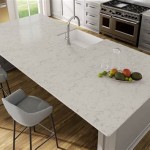How Thick Are Granite Countertops?
Granite countertops are a popular choice for kitchens and bathrooms because they are durable, heat-resistant, and easy to clean. One of the most important factors to consider when choosing a granite countertop is its thickness. The thickness of a granite countertop will affect its durability, appearance, and cost.
Standard Thicknesses for Granite Countertops
The most common thickness for granite countertops is 3 centimeters (cm), or approximately 1.25 inches. This thickness is durable enough for most applications, and it is also relatively affordable. Thicker granite countertops, such as those that are 4 cm or 5 cm thick, are more durable, but they are also more expensive.
Factors to Consider When Choosing a Thickness
There are a few factors to consider when choosing the thickness of your granite countertops.
- Use: The thickness of your granite countertop should be based on how you plan to use it. If you plan to use your countertop for heavy-duty tasks, such as cutting and chopping, you will need a thicker countertop. If you plan to use your countertop for lighter tasks, such as serving food or displaying decorative items, you can get away with a thinner countertop.
- Support: The thickness of your granite countertop will also depend on the support it will receive from the cabinets and walls. If your countertop will be supported by strong cabinets and walls, you can get away with a thinner countertop. If your countertop will be supported by weaker cabinets and walls, you will need a thicker countertop.
- Appearance: The thickness of your granite countertop will also affect its appearance. Thicker countertops look more substantial and luxurious, while thinner countertops look more delicate and modern. Choose the thickness that best suits the style of your kitchen or bathroom.
- Cost: The thickness of your granite countertop will also affect its cost. Thicker countertops are more expensive than thinner countertops. Keep your budget in mind when choosing the thickness of your countertop.
Pros and Cons of Different Thicknesses
Here is a summary of the pros and cons of different granite countertop thicknesses:
| Thickness | Pros | Cons |
|---|---|---|
| 1.25 inches (3 cm) | Most affordable, durable enough for most applications | May not be durable enough for heavy-duty use |
| 1.5 inches (4 cm) | More durable than 3 cm countertops, better support for overhangs | More expensive than 3 cm countertops |
| 2 inches (5 cm) | Most durable, best support for overhangs | Most expensive, may be too thick for some applications |
Conclusion
The thickness of your granite countertop is an important factor to consider when making your purchase. By understanding the different thicknesses available and the pros and cons of each, you can choose the countertop that best meets your needs and budget.

Granite Thickness How Thick Should Countertops Be

Marble And Granite Countertop Thickness In 2024 Com

How Thick Granite Countertops Should Be Brief Guide

How Much Does A Granite Slab Weigh

Everything You Need To Know About Granite Thickness

Choosing The Right Thickness For Your Countertop Granite Works

Granite Thickness How Thick Should Countertops Be

A Countertop On How Thick Is Granite

Understanding Granite And How To Choose The Best For Your Home

What To Know About Countertop Thickness For Marble Or Granite Expo








